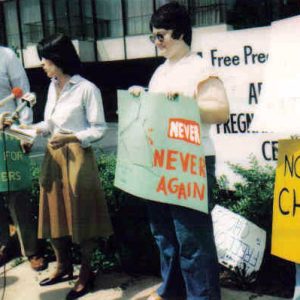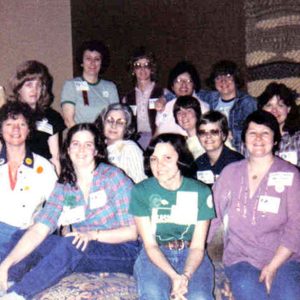calsfoundation@cals.org
Little Rock NOW
The Little Rock (Pulaski County) chapter of the National Organization for Women (NOW) was organized in 1974 is an advocacy group dedicated to women’s rights and issues.
The two waves of the American women’s movement are among the most significant social changes of the twentieth century. The first wave culminated in 1920 when the Nineteenth Amendment gave American women voting rights. The second wave was shaped by and identified with the National Organization for Women, established in 1966 in Washington DC. Led by founding President Betty Friedan, author of The Feminine Mystique (1963), NOW pledged to “take action to bring women into full participation in the mainstream of American society.”
NOW promoted “consciousness raising”—small group discussions of women’s common concerns—followed by grassroots action. As feminist ideas spread across the nation, Pat Johnson organized Arkansas NOW in March 1974 and served as state coordinator. Local chapters quickly formed in Arkadelphia (Clark County), Hot Springs (Garland County), Fayetteville (Washington County), and Little Rock (Pulaski County). Officers of the original Greater Little Rock chapter were President Janet Weston, Vice President Cathy Walker, Secretary Tracy Rhein, and Treasurer Dolly Moseley.
From 1975 to 1979, Amanda Saar joined with NOW chapter members Jean Ann Moles, Libby Raines, and Dolly Moseley to establish Little Rock’s first Rape Crisis, Incorporated (RCI). Saar was outraged when a friend received callous and inept treatment following a violent sexual assault. Rape kits were not available in hospital emergency rooms in central Arkansas. Local doctors and nurses lacked training in the methods of collecting physical evidence from victims to make prosecution of rape possible. Medical or legal professionals did not understand the psychological needs of severely traumatized rape victims. Saar and NOW devoted much of their time in the late 1970s to developing protocols so that health professionals, police, and counselors could better assist rape victims. NOW members and other volunteers operated RCI as a telephone service for four years until a permanent Rape Crisis Center was funded with a $10,000 grant from the city of Little Rock in 1979.
In the early 1980s, Little Rock NOW focused its energies to ratify the Equal Rights Amendment (ERA) to the U.S. Constitution, which stated, “Equality of rights under the law shall not be denied or abridged… on account of sex.” The U.S. Congress sent the ERA to the states in 1972; it was quickly ratified by twenty-two of them. Many conservatives denounced the ERA, fearing it would “unleash the homosexual menace,” eliminate separate public bathrooms for men and women, and “force American mothers into combat.” By the June 30, 1982, the deadline for ratification, only thirty-five states had approved the ERA. The ERA was never released from legislative committees for a vote by the full Arkansas General Assembly.
A new generation of feminist leaders emerged in the 1980s. These were women who had come of age during the anti-war, civil rights, and women’s rights movements. Former Pulaski County NOW president Kathy Webb was elected secretary of the national NOW in 1982 and served in that position until 1986. In 1985, Arkansas Gazette columnist Richard Allin complained that NOW was sexist because “the name [of the organization was not changed] to the National Organization for Women and Men.” Pulaski County NOW mailed Allin a membership application; he did not respond to the invitation.
During the 1980s and 1990s, members wrote letters urging Senators Dale Bumpers and David Pryor to support the Civil Rights Restoration Act of 1985, which was designed to maintain enforcement of civil rights statues at the federal level; marched in Little Rock for NOW’s campaign to save abortion rights; and joined a “silent protest” on the steps of the State Capitol building, where the Ku Klux Klan (KKK) had assembled to protest the birthday holiday of Reverend Martin Luther King Jr. The organization continues to work on behalf of women’s rights, reproductive freedom, and economic equality in Arkansas.
For additional information:
National Organization for Women. http://www.now.org (accessed November 4, 2021).
Kae Chatman
Philander Smith College
 Little Rock NOW
Little Rock NOW  Little Rock NOW
Little Rock NOW 




Comments
No comments on this entry yet.